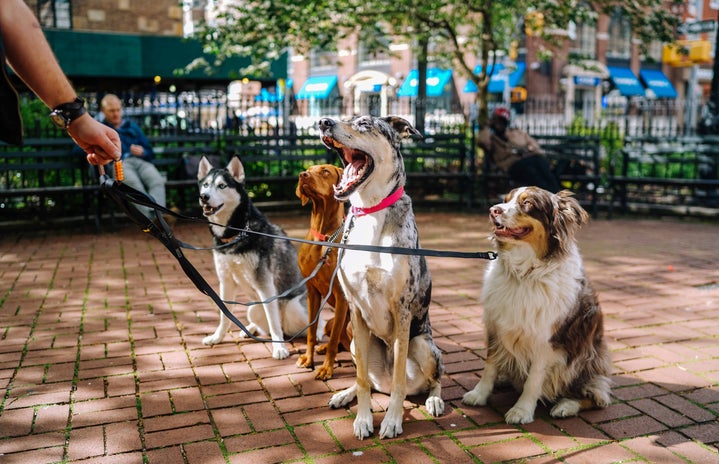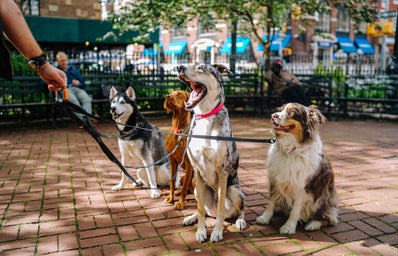Owning a dog in college might seem like the perfect blend of responsibility and comfort, which is true until you’re rushing home in between classes for a potty break or spending your last twenty dollars on dog food instead of coffee. As someone who has experienced the joys and chaos firsthand, I can confidently tell you it’s not all belly rubs and Instagrammable moments. Navigating college life with a wagging tail by your side is a journey filled with highs and lows. Enter Frisco, my beautiful but not-so-graceful Great Dane, who joined me during the summer before my sophomore year. What began as a fun, exciting responsibility quickly turned into a lesson in compromise, problem-solving, and time management.
- Planning for a Dog in College:
-
I started planning to get a dog during my freshman year of college. I did my research, believing I had thought through every scenario whether financial or pertaining to care. At the time, I felt mature enough to handle it.
The first few months of caring for Frisco went smoothly—I had saved enough money for her puppy vet visits, spay surgery, food, and other essentials. Then, during the second semester of my sophomore year, I transferred from a school in Georgia to CU Boulder. Freshman-year me couldn’t have planned for that.
There was no taking Frisco, a large and anxious dog, on a plane, and finding housing in Boulder that allowed such a big dog was a challenge. I made it work, but once settled, I felt nervous about caring for her without the support of family and friends back in Georgia. Fortunately, I found a house that welcomed both Frisco and me with open arms.
Frisco’s time in Boulder has been filled with hikes, camping trips, and an abundance of love from friends, but no matter how well I thought I prepared, there were still moments that proved impossible to anticipate and react to. Caring for a dog is full of surprises, and no matter how prepared you feel, there are situations that can catch you off guard.
- An Unexpected Emergency:
-
The hardest lesson I learned came during an emergency. I was on a ski trip with friends when I received word from a friend watching Frisco; he said she was sick, but initially I wasn’t worried, as most likely she ate something bad.However, when I got home the next day, Frisco couldn’t keep food or water down. Soon after, her back legs stopped working.
We rushed to the emergency vet, where they discovered that her stomach had twisted—a life-threatening condition common in Great Danes. I familiarized myself with the condition by reading resources online, talking to my vet, and talking with my parents, who had both owned Great Danes. I was careful to prevent it, yet despite all my precautions, it still happened.
She needed emergency surgery. Financially I wasn’t prepared for this, so I called my dad who had lost a Great Dane to the same condition when he was in college. He wasn’t optimistic, and suggested it might not be worth the surgery.
I sat in the vet’s office, crying and saying my goodbyes to Frisco. After a difficult conversation with the vet, my dad agreed to the surgery. Hours later, Frisco pulled through. I’m still paying off the debt, but I have a healthy and happy dog by my side today.
Thus, no matter how much you prepare, emergency situations are unavoidable. Owning a dog in college has its rewards, but it comes with its fair share of struggles.
- The Perks of Caring for a Dog in College:
-
Owning a dog in college can provide emotional support during tough times. College is a period of major change for most people; filled with deadlines, exams, and the stress of balancing social life with academics. Studies show that pets can help reduce anxiety and depression while providing comfort, and Frisco has certainly been a source of comfort for me during stressful moments. Here is more information on how dogs can impact mood.
Another positive is howFrisco helps me maintain a routine. Being a dog owner forces you to stick to a schedule, which can be difficult in college. You can’t skip their feeding times or walks just because you’re late to class. This responsibility can actually benefit your academic life, helping you develop time management skills and healthier habits, like regular exercise.
Dogs are also natural conversation starters. Whether you’re walking them around campus or hanging out in a park, people are bound to stop and make comments.Owning Frisco has helped me meet new people, and I always get comments like, “That’s not a dog, it’s a horse!” when we’re on walks.
- The Struggles of Caring for a Dog in College:
-
One of the biggest challenges is time management. Between classes, study sessions, and extracurricular activities, it feels like time is always running out.Dogs require regular walks, feeding, playtime, and trips to the vet—things that don’t fit neatly into a student’s unpredictable schedule.
Another significant factor is financial responsibility, as being a dog owner is more expensive than most students anticipate. Between food, vet bills, grooming, and the occasional toy, costs add up quickly. On a student budget, every dollar counts, and sometimes you have to make difficult choices about where your money goes.
College life comes with spontaneous road trips or last-minute nights out with friends. However, with a dog, spontaneity becomes more complicated. You can’t leave them alone for long, and their needs must be factored into your plans.
As a result, Frisco and I stay in Boulder for Thanksgiving instead of making the two-day drive back to Georgia to visit family. While I miss seeing my family, we’ve made new traditions and always have a great Thanksgiving here.
- Tips for Students Considering Adopting:
-
If you’re considering adopting a dog while in college, it’s important to be prepared for both the joy and responsibility that comes with it. Here are a few tips to help you make an informed decision:
1. Assess Your Schedule
Before adopting, take a close look at your schedule. Do you have enough time to walk, feed, and play with a dog every day? Dogs, especially puppies, require a lot of attention. If your schedule is packed with back-to-back classes, study groups, and social events, you might struggle to give your dog the care it needs. Consider if your daily routine has room for quality time with your new companion.
2. Think About Your Living Situation
Beware that not all dorms, apartments, or student housing allow pets, and even if they do, some have size or breed restrictions. Also, consider whether your space has enough room for the dog to feel comfortable—especially if you’re thinking about a larger breed like a Great Dane! Be prepared to spend time searching for pet-friendly housing and to cover l pet fees.
3. Be Financially Ready
Owning a dog can be expensive, and as a student, you might already be on a tight budget. Before adopting, consider whether you can afford the recurring costs. It’s also a good idea to set aside money for unexpected expenses, which can prevent financial stress down the road.
4. Plan for Care During Breaks
College breaks can be long, so it is wise to think ahead about who will care for your dog during these times. If you’re planning to travel home or go on vacation, make sure you have a plan in place, whether it’s taking your dog with you, finding a pet sitter, or using a boarding facility.
5. Consider the Breed and Size
The breed of dog you choose can have a big impact on your lifestyle. For instance, active breeds like Border Collies or Huskies require more exercise and mental stimulation than laid-back breeds. Larger dogs also need more space and come with higher costs for food and care. Be honest with yourself about what type of dog would fit best with your energy level, living space, and daily routine.
If you’re adopting (which I highly encourage!) it’s important to ask the shelter about the dog’s specific activity level, temperament, and special needs they may have. While mixed breeds can have a variety of traits from their parent breeds, shelter staff often have valuable insights from observing the dog’s behavior and health.
A trusted source for more information on adopting mixed-breed dogs is the American Society for the Prevention of Cruelty to Animals (ASPCA), which provides helpful guides on what to ask when adopting.
6. Build a Support System
Whether it’s roommates, friends, neighbors, or a trusted pet sitter, having reliable people to reach out to in a pinch is essential. You might need someone to walk your dog if you’re running late or watch them if you need to travel. Building a network of support makes the responsibilities of dog ownership much more manageable.
7. Consider Adopting an Older Dog
If a puppy feels too overwhelming, consider adopting an older dog. They tend to be less high-maintenance and often come with some training already. They’re a great option for students who want the companionship of a dog but aren’t committed to raising a puppy. However, it’s important to ensure that your environment is stable for the dog’s temperament. Consider how the dog will adapt to living with other pets or people, as some dogs may be better suited to a less social environment. Consulting a shelter staff about the dog’s personality is important, as it can make the transition into your home smoother. Here are more adoption and rescue tips.
Adopting a furry companion in college can be incredibly rewarding, but it’s a big responsibility. By carefully considering your schedule, living situation, and budget, you can make an informed choice about whether you’re ready for the commitment.
Caring for a dog in college is full of both highs and lows. From emotional support and new friendships to managing time and finances, it’s a journey that requires careful thought. While I wouldn’t trade my time with Frisco for anything, I’ve learned that being a dog mom in college brings unique challenges. If you’re thinking about it, just be sure you’re ready for the rewards— and the responsibilities.


